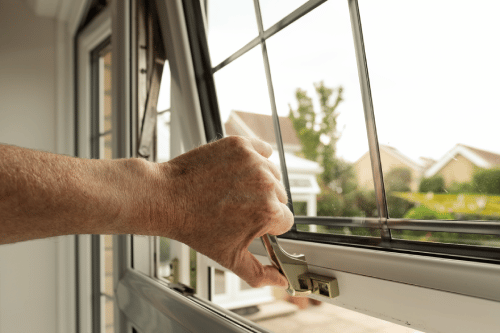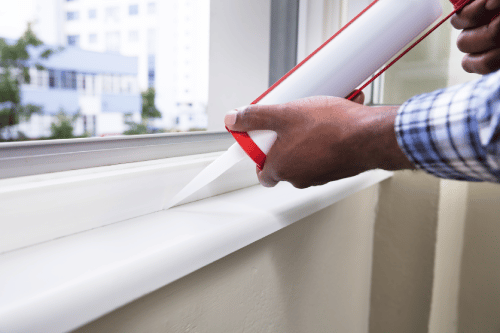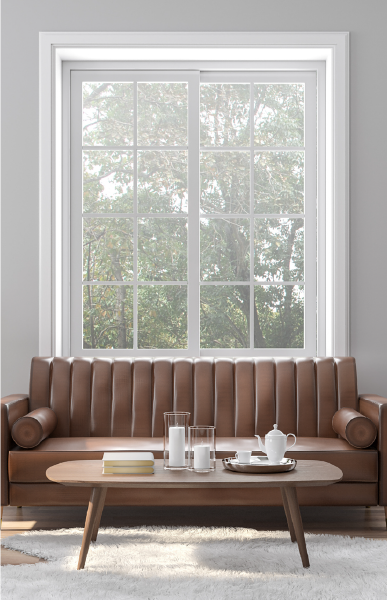If you found yourself bundling up with extra blankets this past winter, you’re not alone. According to the National Weather Service, the 2021-2022 winter blew in at a shivering 4 degrees colder than previous years—a chilling prospect, especially if your home has older, drafty windows in need of fixing.
Even if you didn’t notice the chill, we guarantee your wallet did. That’s because a shocking 30% of the average home’s heating energy is lost through drafty or out-of-date windows. In a world with increasingly unpredictable climates and skyrocketing energy expenses, that percentage simply isn’t affordable or sustainable.
So how do you fix it?
Drafty windows are no one's friend, but they’re also relatively easy to fix and manage. DIY options abound, as well as cost-effective window upgrades that will improve your curb appeal and decrease your utility bills. So which choice is best for you and your home? Below, we’ll walk you through several ways to fix and reinforce your current windows as well as the top options for drafty window replacements.
Sealing drafty windows
Fixing drafty windows is all about sealing cracks and gaps. Depending on the age of the windows, the severity of the leaks, and the type of climate you live in, there are different methods to success. Let’s take a closer look at the top three ways to seal a drafty window.
1. Locking and weather stripping
This might seem like common sense, but the first step in fixing drafty windows is to double check they’re locked. The locking mechanism on windows pulls the sashes (the movable section holding the glass panes) nice and tight so outside air won’t creep in. If you have large windows and the locks aren’t quite giving you the seal you need, consider installing additional locks to ensure the sash and frame are connecting securely.
If the locks alone aren’t solving your issue, you may try to add a bit of weather stripping. These slim foam or plastic strips attach to the sashes and help fill in the gaps where the locks can’t. If air is still escaping, it’s also a good idea to weather strip the top, sides, and bottom of your doors. Even a small door gap can undo all your window work, so better safe than sorry.

2. Caulking
Caulking is an effective method of addressing drafty windows, but not necessarily the easiest or cleanest solution. Caulk is essentially a thick glue that fills unwanted gaps. It’s not exclusive to windows — it’s often used in bathroom tiling, kitchen counters, and a number of other household construction activities. Once applied, caulk can be flattened and painted to appear less like a filler.
The issue with using caulk for windows is that while it does close gaps, it also closes your window. Caulk is temporary — you can remove it in the summertime — but if you end up using it to seal cracks in the winter, you can’t unmake that choice if an unexpectedly warm day rolls around. We only recommend caulking your windows if you live in heavy snow areas where you can expect a long, reliable winter.

3. Reglazing
Sometimes, drafts are simply a symptom of time. Especially in older homes, windows often go untreated for years on end, which can result in natural decay of the hardened, weathertight putty that lives between your glass and sash (known as the glazing compound) or the glass itself.
“Reglazing” can refer to the replacement of your window glass, or the putty seal between the glass and the wood in older windows. So if you live in an older home or apartment, check your window panes. If you have missing chunks of glass or your panes are loose, it’s time for a reglaze.
We recommend outsourcing to a professional for the reglazing process, but you can DIY it if you know what you’re doing. The most important thing to remember with reglazing is that you want to examine the entirety of the window to ensure your glass and/or seal is the only problem. Replacing your glazing only to find out that your frame and sash are equally defunct is not cost-effective. Be sure to check the glass and the frame for any parts that need replacing before you start scraping off old glazing compound and taking the window apart. After all, the only thing worse than a drafty window in winter is no window at all!
How to fix drafty windows in rentals
While the above solutions are fantastic for owners, renters also need tools to save money and stay warm. If you’re a renter trying to fix drafty windows, your first stop should always be to your landlord. However, if you’ve ever rented before, you know that isn’t always the fastest solution to your problem.
If you’re on a rental contract and can’t do major alterations or repairs, curtains, shades, and/or plastic insulation are removable solutions that won’t break the bank.
Curtains and shades
Heavy curtains and shades don’t just keep light out—they also keep outside temperatures at bay. Many companies sell thicker thermal curtains with high-strength curtain rods in areas where the winter hits hard. They act like a parka for your windows and help keep the inside warm and toasty.
Multiple window dressing layers can also help manage drafts. Layering curtains on top of shades may seem like a lot of fabric, but it helps you control how much heat leaves and enters as the weather changes. For instance, on those sunny winter days, you may not want to venture outside, but letting the sun come in through your glass windows can help heat your home. You can always close everything back up again when the sun sets.

Plastic insulation
If you don’t want to hang lots of fabric, insulating drafty windows is another renter option. Plastic insulation kits are a great solution for any renter, no matter how extreme your winters get. Available at your local hardware store or online, insulation kits are affordable and easy to apply. Most of these kits include plastic film or sheeting that you attach to the window with tape and then heat to shrink and fit. They don’t cause permanent damage or alteration, so they’re worry-free for renters.
Drafty window replacement
Of course, the best way to permanently fix a drafty window is simply to replace it with a high-quality, long-lasting, energy-efficient model. Now, any new model will likely fix a lot of your draft issues, but replacing a leaky single-paned window with an energy-efficient model can have a huge impact on your utility bills. If you're looking for a more permanent fix to your drafts, here are the three types of glass we recommend investing in for energy-efficient windows.
1. Triple-pane windows
Triple-pane windows receive the highest ratings for energy efficiency in all regions of the United States. While double-paned windows are popular energy savers due to pricing, triple-pane windows are 40-50% more efficient at blocking outside temperature fluctuations. Depending on where you live, the higher price for triple-pane can be well worth the energy savings.

2. Super spacer windows
Super spacer windows are thermally-efficient, condensation-free windows. The edge spacers of these windows are made of 100% polymer structural foam, which gives them an extremely low conductivity rate that helps regulate both hot and cold temperatures. With a focus on humidity control, super spacer windows are also ideal for homes in wet climates that struggle with mold or rot.
3. Energy Saver R-5 windows
Energy Saver R-5 windows are a slightly less effective, but more affordable option for energy-efficient windows. They provide 25% more insulation than standard glass, which helps regulate temperatures at hot and cold extremes. These windows are double-paned and highly durable.
Work with the experts to find the best drafty window solution
DIY projects are a fun challenge for certain areas of your home, but sometimes it makes more sense to call in the experts. For custom-built windows that meet your home’s specific needs, reach out to Window Nation. We offer replacement windows for any room in your home with a focus on quality, energy efficiency, expert installation, and lifetime satisfaction.
Request a free quote from Window Nation today and wave those sky-high energy bills goodbye.


